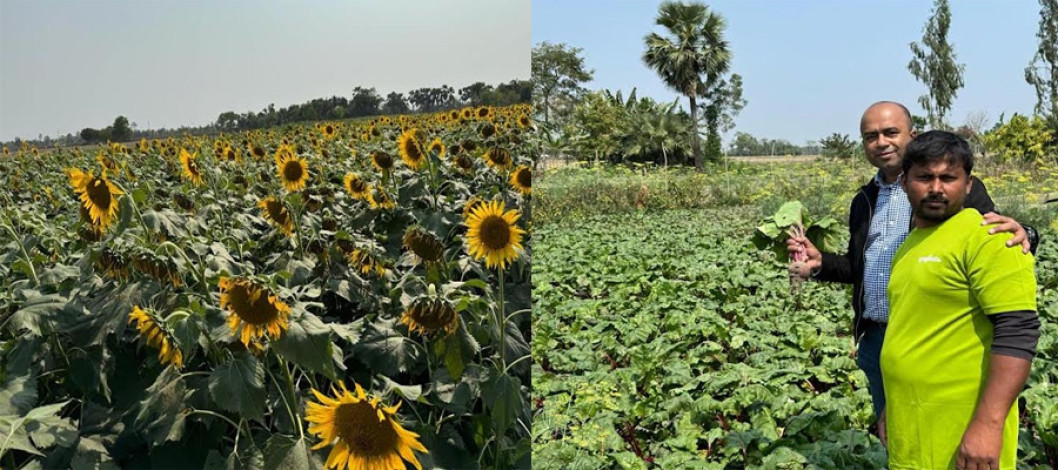
Photo: Collected
The saline lands in the district have now seen incredible agricultural success. The horizon has turned green with maize and vegetable crops in the crop fields. Single-crop lands are now being converted to three crops. In that saline land, various types of vegetables including gourds, pumpkins, papayas, gourds, puishaks, ucchas, cucumbers red cabbages, and ucchas have been successfully grown.
Due to salinity, the land has not yielded crops for the past few decades. Fresh water reservoirs have dried up. Although the canal flows past the village, the farmers of the coast cannot grow crops due to lack of water. Drought is on the horizon during the dry season. Meanwhile, the farmers of this area are dreaming of the possibilities. They collect fresh water by making ponds in the corners of fallen cropland. Crops are now grown with that water. The horizon has turned green with maize and vegetable crops in the crop fields. Single-crop lands are now being converted to three crops.
This change in the story is the name of the farmers of Khutikata village of Kashimari union of Shyamnagar upazila of Satkhira. Earlier, farmers here could only cultivate Aman paddy. Now in that salty land, various types of vegetables including gourd, pumpkin, papaya, dherash, puishak, Uchche, cucumber, and red vegetables and Uchche have been successfully produced. They are showing a dream of possibilities to the surrounding farmers. Wasteland now shows hope. They are dreaming for the future.
Marginal farmers of Khutikata village Nirmal Sarkar, Rabindra Nath Sarkar, and Nihar Sarkar said that hundreds of hectares of agricultural land in their village fall due to salinity. Crops are not yielding properly. Moreover, the freshwater reservoirs have dried up. Last year, with the help of Syngenta, they produced crops on saline land, and they responded well to the area. Syngenta has dug ponds for most of the farmers in the village to store rainwater. Apart from this, Verming Compost has also supplied plant fertilizers, crop seeds, and other agricultural inputs for cultivation. Farmers are benefiting from using rainwater to grow a variety of crops on saline land. In the current season, each farmer has earned 30-50 thousand rupees per bigha of land. By digging more and more ponds and re-digging the canals running over the village to conserve rainwater, it is possible to produce a variety of crops including vegetables throughout the twelve months.
Hedayet Ullah, managing director of Syngenta Bangladesh Limited, said that due to salinity in the region of Satkhira, crops could not be grown throughout the year. There it has been possible to convert one crop field into three crop fields with Syngenta's technical and material support. It has improved the capacity and livelihood of farmers. A major change has been brought about in agriculture. Syngenta is implementing sustainable agriculture systems as well as regenerative agriculture methods in the region. Many goals of the SDGs are being met through the implementation of the Go Grow project. Besides, the project is working as a model in building capacity to deal with the risks of climate change.
Director (Business Sustain Ability and External Affairs) of Syngenta Bangladesh Limited associated with this program. Shahidul Islam said, that considering the situation of the coast, Syngenta is conducting the digging of ponds in the crops of farmers. Farmers are benefiting from this. Farmers can grow crops on saline land by storing rainwater. Besides digging more ponds in sub-urban areas, open water bodies should be preserved. So that farmers can use rainwater to produce crops.
Syngenta is training the farmers on pond digging as well as seeds, vermicompost, solar irrigation, and agriculture. Syngenta provides effective advice on maximizing crop yields through moderate use of seeds and pesticides. All in all, sustainable agriculture systems as well as regenerative agriculture methods are being followed among the farmers of this region. He pointed out that many goals of SDG are being fulfilled through the successful implementation of the project.
It is known that Syngenta Bangladesh Limited has adopted the Go Grow project to transform agriculture into sustainable through crop cultivation in Khutikata village. Several organizations are involved in this project which started last year.
Department of Agricultural Extension (DAE), Bina, SAC Scheme of DAE and SRDI. In the beginning, fresh water supply was done by digging ponds. This program started with 40 farmers of Khutikata village. Those farmers dug some ponds in the corner of the land. A pond needs to be dug 10-15 feet deep. Excavation costs about 1 lakh rupees. And that pond acts as a reservoir of fresh water. During vegetable and grain cultivation, irrigation is done with pond water. However, to increase the supply of fresh water, such ponds should be dug as well as existing canals to supply water. Then it is possible to increase production more in this region.
In this regard, Satkhira District Commissioner Mohammad Humayun Kabir said that people living in sub-districts have to face various natural disasters every twelve months. Due to storms, floods, and droughts, it has become difficult for these sub-tribes to survive. If the land falls there, they face huge economic losses. We have to find a way to make them economically independent as well as survive. Because it is not possible for anyone to stop storms, tides, and floods, as a result, crop production should be increased to survive in such an environment. Initiatives will be taken to expand Syngenta's technology to other villages in the district. Along with the government, the private sector needs to come forward. Planting different varieties of paddy, vegetables, fruits and other plants in salt water requires a collective effort from all. He said that effective initiatives will be taken to conserve water in canals for the purpose of supplying fresh water.
Source: Online/GFMM
Comment Now